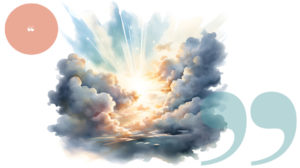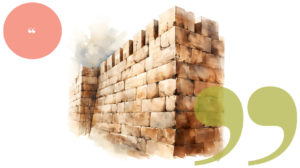True Happiness

They forget, for a while, everything that causes them to be angry, sad, discouraged, or disappointed.

"You shall rejoice with all the good that Hashem, your G-d, has given you and your household ... ” (Ki Savo, 26:11)
“Because you did not serve Hashem, your G-d, amid joy and goodness of heart, when everything was abundant.” (28:47)
“Can it be?” people ask. “Can it be that all the evil we suffer, Rachmana l’tzlan, is because we do not serve Hashem with joy? (Bircas Mordecai, by Rabbi Baruch Mordechai Ezrachi)
We are prepared to do almost anything. To bake and cook and prepare wonderful holiday meals. To dress the platoon of children, from the kippahs on their heads to the toes of their socks, and to try not to spend in excess of our budgets. To keep the house more or less clean and organized — at least for Shabbos. To go out to work, and at the same time keep up with the housework, and still give our family members enough attention, and cook and clean some more ... But then, on top of all that, we’re expected to be happy??
Happiness is not an added benefit of life, or a secret spice saved for special occasions. Happiness is a basic obligation of Judaism.
“Because you did not serve Hashem, your G-d, amid joy and goodness of heart.”
Really? But how can we attain a state of joy, how can we ensure our own happiness?
“If you see someone begin to dance exuberantly at the sound of music, that is no indication that the person is happy. It may be that the person is simply dancing, and that his movements are not at all an expression of joy.”
Your friend invites you to a women’s concert. At first, you are reluctant to go. But she tells you, “Come on! You deserve a night out! You’ll have a great time!” So you go. And for a few hours, you forget the piles of laundry and dishes and homework you will have to deal with the next day, as you are mesmerized by the amazing music. Is that happiness?
“What is the difference between joy and folly? Between happiness and foolishness?
Happiness is the result of heightened awareness and sensitivity. For only by recognizing what is beautiful, pleasant, and faultless, can we attain a state of true joy. Foolishness is the result of getting distracted, of not paying attention to the significance of one’s thoughts and actions.”
Millions of people in the world spend their lives shopping, dining, attending performances, and lounging on the beach. It’s true that they are refreshing and enjoying themselves, and resting. But above all ... they are forgetting. They forget, for a while, everything that causes them to be angry, sad, discouraged, or disappointed.
And is that such a bad thing?
No it isn’t bad at all. But it isn’t happiness.
Happiness is not about denial. It is about acknowledgement.
“It is written, ‘Who is rich? One who is happy with his lot.” (Avos). That is to say – happy, and not [merely] content. And certainly not one who tries to forget that he is poor. That is not a rich person.”
It isn’t the shopping that makes you happy. Happiness is a state of mind not dependent on a particular event. You aren’t happy that you went shopping. But you can develop an awareness, a sense of joy, over having money to shop with, over having who to shop for!
“When Hashem commands us to be happy, His intention is that we recognize and acknowledge all the good in our lives. We must be aware of what we have, and know that it comes directly from Hashem. Only then can we be truly happy.
And if Heaven forbid, you are not happy, then you obviously do not know how much you really have to be thankful for. An unhappy person is in fact an ungrateful person.”
The holidays are fast approaching. We have a lot of hard work to do, buying and preparing everything we’ll need. But don’t forget — we also have to be happy!
We must be happy that Hashem has given us Rosh HaShanah. That we have the opportunity to draw closer to Him. And we must be happy for the chesed and rachamim of Yom Kippur, and for the fact that we have the merit to raise ourselves to such a holy level! And we must be happy for Succos. Seven whole days with the Shechinah in our midst!
We are happy to host guests, to be guests, to prepare, to serve, to spend time with our families, and fulfill the mitzvos that HaKadosh Baruch Hu gave us. Our homes will be islands of joy and celebration, of song and dance.
To serve Hashem — that is true happiness.
(Originally featured in Family First, Issue 108)
Oops! We could not locate your form.








